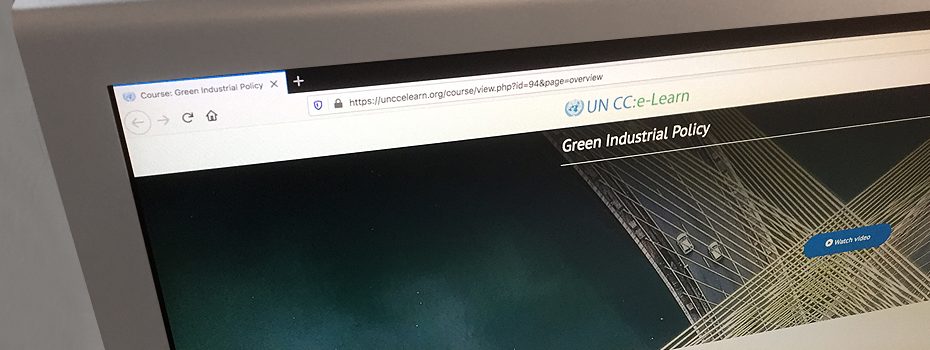14th July 2020 PROMOTING COMPETITIVNESS AND STRUCTURAL TRANSFORMATION
A new course by the Partnership for Action on Green Economy (PAGE)
What policies can countries implement to address the two defining crises of our time—COVID-19, and the climate emergency? How do we build the next generation of leaders—and those that inform and educate them—needed to advance green, structural change?
In seeking to answer both of these questions, the Partnership for Action on Green Economy’s (PAGE) new course on Green Industrial Policy could not be timelier. Developed by UNEP, UNIDO, and UNITAR, the course forms part of PAGE’s “Global Learning for a Green Recovery” initiative, and is available on UNITAR’s flagship UN CC:e-Learn platform.
With countries estimated to invest more than US$20 trillion to recover from the fallout of COVID-19, policymakers may rely on established approaches to promote new economic sectors and accelerate structural economic change. Industrial policy—or strategic government measures which aim to stimulate particular sectors of the economy—has traditionally been employed to enhance productivity, boost competitiveness, and promote economic growth.
Green industrial policy follows this same approach of state-driven structural change to accelerate the shift of resource- and carbon-intensive sectors onto greener trajectories. By drawing from recent examples of green industrial policy, governments can therefore reap the benefits of traditional industrial policy approaches while also positioning themselves to tackle greater environmental challenges ahead.
However, one practical challenge lies in ensuring that countries are equipped with the knowledge and skills needed to do so. To address this gap, PAGE’s new course offers high-quality, multimedia material designed to advance learning on green industrial policy at a high technical level, providing an immediate building block as countries plan their economic responses to COVID-19. Charting a path from conceptual understanding to practical application, the course will enable users to:
• Explain the rationale for advancing green industry
• Differentiate the main concepts related to green industrial policy
• Highlight relevant empirical evidence in support of policy reform
• Distinguish policy instruments to foster structural change
• Appraise strategic considerations during policy design, implementation, and evaluation
• Outline the relationship between green industrial policy and trade.
At the same time, a range of didactic instruments offered by the course—including short video lectures, curated readings, podcasts, factsheets, and assessments—can be integrated into existing instructional activities, such as workshops, lectures, or seminars. This deliberate approach has been taken to support universities, training institutions, and other learning practitioner’s in their quest to develop the green leaders of tomorrow. The course therefore serves two kinds of users—individual learners interested to enrol in a self-paced online course, and lecturers and instructors who seek course material and didactic instruments for their teaching.
PAGE’s new course on Green Industrial Policy: Promoting Competitiveness and Structural Transformation, forms part of PAGE’s “Learning for a Green Recovery” initiative. A promotional video for the course can be viewed here (youtube.com), while the course, and others in this new series, can be taken online at UNITAR’s flagship UN CC:e-Learn platform https://unccelearn.org. For more information on the course, please contact Colm Hastings (colm.hastings@unitar.org).


